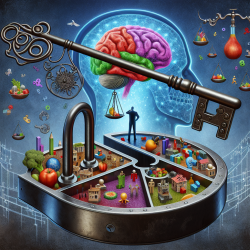Introduction
As practitioners in the field of speech-language pathology, understanding the factors influencing adolescent mental health is crucial for developing effective interventions. Recent research, "The Prospective Associations between Self-Efficacy and Depressive Symptoms from Early to Middle Adolescence: A Cross-Lagged Model," sheds light on the relationship between self-efficacy and depressive symptoms in adolescents. This blog explores the implications of these findings for practitioners and suggests ways to enhance therapeutic outcomes.
Understanding Self-Efficacy and Its Impact
Self-efficacy, as defined by Bandura's social cognitive theory, is the belief in one's ability to execute actions necessary to achieve specific goals. It plays a significant role in adolescents' emotional well-being, influencing their ability to handle academic, social, and emotional challenges. The study highlights that depressive symptoms can predict subsequent levels of academic and emotional self-efficacy, suggesting a unidirectional influence where depressive symptoms negatively impact self-efficacy.
Key Findings from the Research
- Depressive symptoms consistently predicted lower levels of academic and emotional self-efficacy over a 2.5-year period.
- Self-efficacy did not predict subsequent depressive symptoms, indicating a one-way relationship.
- No significant gender differences were found in the bidirectional associations between depressive symptoms and self-efficacy levels.
Implications for Practitioners
For practitioners, these findings underscore the importance of addressing depressive symptoms to enhance self-efficacy in adolescents. Here are some strategies to consider:
- Focus on Emotional and Academic Support: Since depressive symptoms impact emotional and academic self-efficacy, providing targeted support in these areas can help mitigate the negative effects of depression.
- Incorporate Self-Efficacy Building Activities: Engage adolescents in activities that promote a sense of achievement and mastery, such as setting realistic goals and celebrating small successes.
- Utilize Cognitive Behavioral Techniques: Implement cognitive-behavioral strategies to help adolescents reframe negative thoughts and build resilience against depressive symptoms.
Encouraging Further Research
While the study provides valuable insights, further research is needed to explore the nuances of the relationship between self-efficacy and depressive symptoms. Practitioners are encouraged to contribute to this body of knowledge by documenting their observations and outcomes in clinical settings.
To read the original research paper, please follow this link: The Prospective Associations between Self-Efficacy and Depressive Symptoms from Early to Middle Adolescence: A Cross-Lagged Model.










